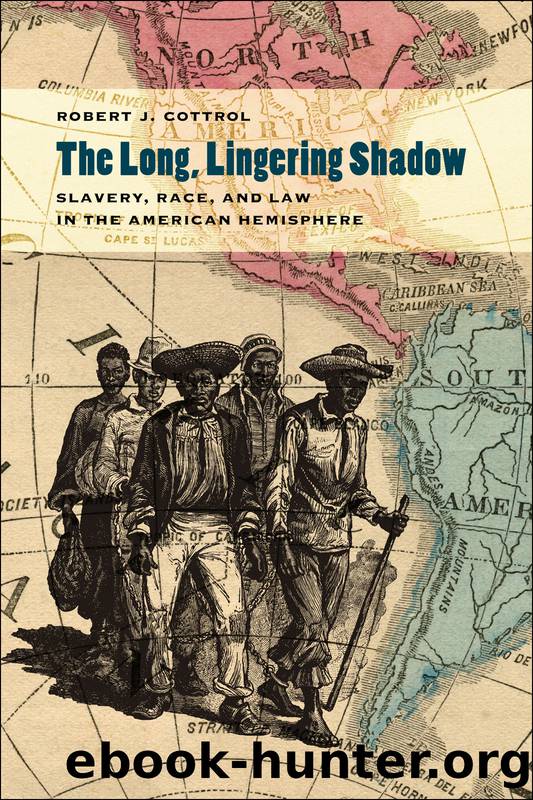The Long, Lingering Shadow by Cottrol Robert J.;Finkelman Paul;Huebner Timothy S.;

Author:Cottrol, Robert J.;Finkelman, Paul;Huebner, Timothy S.;
Language: eng
Format: epub
Publisher: University of Georgia Press
Published: 2013-08-15T00:00:00+00:00
PART III
From Emancipation to Equality
CHAPTER SEVEN
An American Sea Change
THE LAWâS POWER AND LIMITATIONS
NO EVENT BETTER ILLUSTRATES the determination of Americans in the first decade of the twenty-first century to turn their backs on the twentieth-century legacy of Jim Crow than the election of Barack Hussein Obama as president on November 4, 2008. Many Americans, including many who indicated that they had not voted for him, expressed satisfaction at the electionâs outcome. The Tea Party movement, disagreements over health care legislation and Afghanistan, and strong dissatisfaction with a stubbornly depressed economy and the partisan bickering to which every president is heir, these would come in the future. But on that Election Day, in November most Americans were pleased. A number of commentators expressed the view that the election was a harbinger of a new day for the American republic, an indication that the nation had finally put race behind it. Some went so far â prematurely, in my view â as to herald a new âpostracial America,â one in which the old divisions no longer mattered. Others demonstrated that they had forgotten a major component of the nationâs racial history. They asked, âWhy is Obama being proclaimed as the nationâs first black president? His father was one of the Luo people of Kenya, it is true, but his mother was after all a white American. Shouldnât he be considered multiracial?â In any event, most Americans recognized him as the nationâs first black president and, if the press reports and polling data are accurate, seemed to have taken no small measure of satisfaction from the nationâs accomplishment.1
And it was not only in the United States that the election was applauded. Heralded around the world, the election was cheered as evidence of a new day in the United States. The news was proclaimed with banner headlines by the worldâs newspapers. More important, in the still young twenty-first century, the election of the American nationâs first black president was greeted with great enthusiasm by the talking heads of the worldâs insatiable television news services. But the enthusiasm spread far beyond the headlines and sound bites proffered by professional pundits and journalists. It could be found around the world. In Kenya, birthplace of Obamaâs father, enthusiastic crowds carried the Stars and Stripes through the streets of Nairobi. There was an air of popular enthusiasm for the election throughout the world, partly a reflection of the unpopularity of the outgoing Bush administration, partly a reflection of the amazement that the United States, of all places, would elect a black president.2
For many, the image of the American nation had remained frozen in time. The United States was the home of Jim Crow, a nation of violent racists, the land of racial oppression. The stereotype in its crudest form was woefully out of date. By the time Obama had gained his substantial electoral and popular victory over Arizona senator John McCain, the United States had already changed in ways that would have made it unrecognizable to Americans who had lived through the Jim Crow years of the early and middle parts of the old century.
Download
This site does not store any files on its server. We only index and link to content provided by other sites. Please contact the content providers to delete copyright contents if any and email us, we'll remove relevant links or contents immediately.
| Civil Rights | Discrimination |
| General | Human Rights |
Day by Elie Wiesel(2252)
The Age of Genius by A. C. Grayling(2177)
Gideon's Spies: The Secret History of the Mossad by Gordon Thomas(1956)
The Gulag Archipelago (Vintage Classics) by Aleksandr Solzhenitsyn(1732)
FATWA: Hunted in America by Pamela Geller(1726)
Columbine by Dave Cullen(1505)
Examples & Explanations: Administrative Law by William F. Funk & Richard H. Seamon(1334)
Men Explain Things to Me by Rebecca Solnit(1323)
The Rule of Law by Bingham Tom(1323)
Anatomy of Injustice by Raymond Bonner(1273)
Three Cups of Tea by Greg Mortenson(1264)
ADHD on Trial by Michael Gordon(1247)
That Every Man Be Armed by Stephen P. Halbrook(1244)
Gideon's Spies by Gordon Thomas(1219)
Palestinian Walks by Raja Shehadeh(1145)
The Source by James A. Michener(1140)
Fast Times in Palestine by Pamela Olson(1123)
Nothing to Envy by Barbara Demick(1045)
Constitutional Theory by Carl Schmitt(1042)
